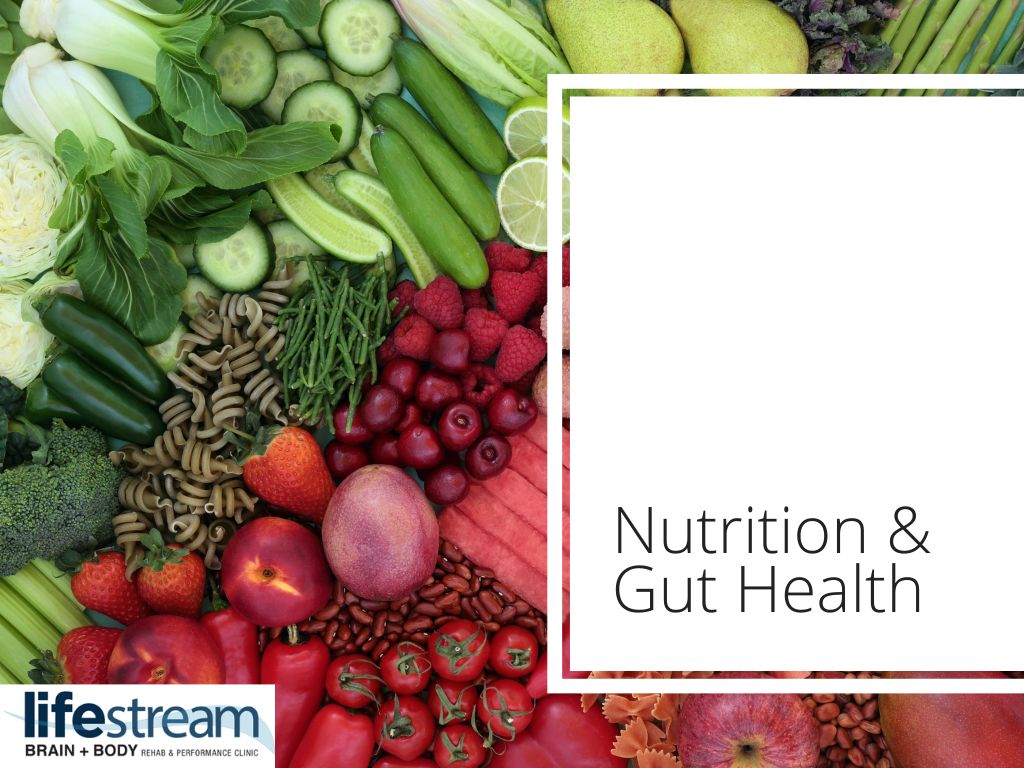Nutrition + Gut Health
How important is gut health and can diet really play a large role in my gut health?Your gut, also known as the entire human intestinal tract, is home to over 100 trillion microbial cells. That’s more than the estimated number of cells that the average man has in his entire body! This complex community of microbes can influence physiology, metabolism, immune function, and synthesize certain vitamins and essential amino acids. Consequently, they are also involved in modulating diseases such as type 2 diabetes, inflammatory bowel disease, cardiovascular disease, and cancer. It has been documented that drastic diet changes can induce large, temporary shifts in the gut microbiota in as little time as 24 hours.
What can happen when many factors such as poor nutrition, stress, heavy alcohol use, and heavy metal toxicity damage the intestinal lining? The junctions between the cells of the gut lining are supposed to be tight, but they begin to spread apart and allow microorganisms to pass through into the blood. This is known as leaky gut syndrome. Altered gut microbiota, otherwise known as dysbiosis, is linked with this increased permeability of the intestinal lining. Studies have also linked intestinal dysfunction and gut dysbiosis to traumatic brain injuries such as a concussion. It is not clear the exact correlation, but a correlation is present.
What can you do to improve your gut health?
- Eat a diverse diet of fresh fruits and vegetables (these are rich in fiber and essential nutrients)
- Opt for whole carbohydrate sources such as potatoes, whole grains, and root vegetables instead of eliminating carbs completely (rich in fiber and beneficial carbohydrates)
- Avoid processed foods that contain simple sugars, inflammatory fats, and additives
- Consume probiotic-rich foods such as yogurt with live cultures, sauerkraut, kombucha, and pickled vegetables
- Consume probiotics and enzymes in supplement form to fill the gaps in your diet
Sources:
https://www.ncbi.nlm.nih.gov/pmc/articles/PMC3667473/
https://journals.plos.org/plosbiology/article?id=10.1371/journal.pbio.1002533
https://www.ncbi.nlm.nih.gov/pmc/articles/PMC5385025/
https://www.ncbi.nlm.nih.gov/pmc/articles/PMC8100306/
https://www.ncbi.nlm.nih.gov/pmc/articles/PMC4612051/
https://www.hopkinsmedicine.org/health/wellness-and-prevention/eating-for-your-gut
https://www.hsph.harvard.edu/nutritionsource/microbiome/
https://www.ncbi.nlm.nih.gov/pmc/articles/PMC3667473/
https://journals.plos.org/plosbiology/article?id=10.1371/journal.pbio.1002533
https://www.ncbi.nlm.nih.gov/pmc/articles/PMC5385025/
https://www.ncbi.nlm.nih.gov/pmc/articles/PMC8100306/
https://www.ncbi.nlm.nih.gov/pmc/articles/PMC4612051/
https://www.hopkinsmedicine.org/health/wellness-and-prevention/eating-for-your-gut
https://www.hsph.harvard.edu/nutritionsource/microbiome/

